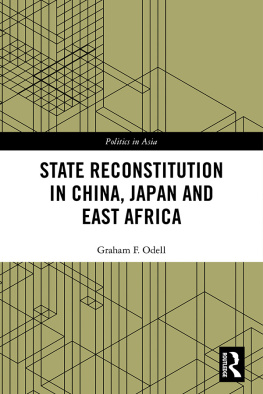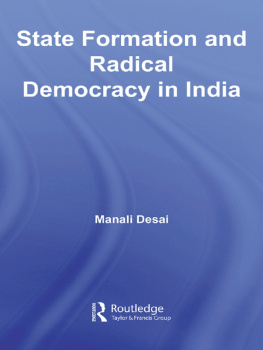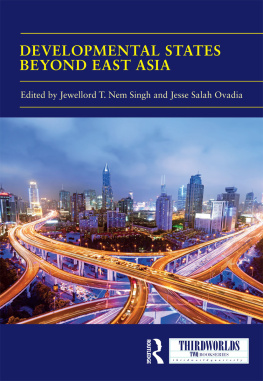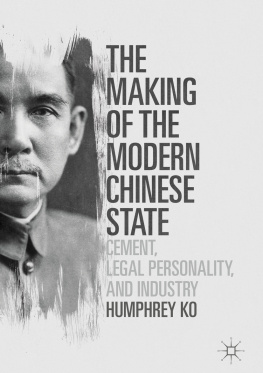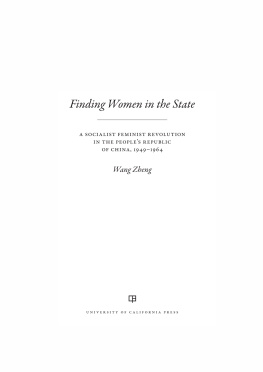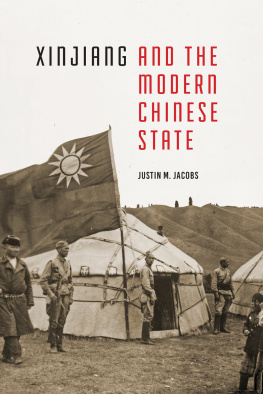State Reconstitution in China, Japan and East Africa
Presented through an investigation of Sengoku Japan and Republican China, this book proposes an innovative explanation of state formation that focuses on ideational and geographic factors.
This study addresses the question; why are some collapsed states able to reconstitute themselves where others have not? Graham F. Odell employs two cases of successful state reconstitution Republican China (19121949) and Sengoku Japan (14771615) to derive a new theoretical framework around this question. These cases are distinct across several significant factors, making them ideal for a research design that seeks to formulate an original theoretical explanation for a phenomenon. Taken together, these two periods of Chinese and Japanese history are paradigmatic cases of state collapse and reconstitution and thus intrinsically compelling to the study of state formation. By developing a new theory of successful state reconstitution through emphasizing the roles of ideology, political symbolism and the geographical distribution of social power, this text provides an answer to the question that has not only scholarly and practical implications, but also a wide geographical applicability.
This book will be key reading for scholars interested in matters of international politics, political science, and state formation, especially in East Asia.
Graham F. Odell is a comparative-historical political scientist who currently lectures at California State University, Long Beach. His research focuses on East Asian state formation and national identity and qualitative methods. He has contributed to the International History and Politics newsletter (Spring 2018).
Politics in Asia series
Indias Maritime Strategy
Balancing Regional Ambitions and China
Shishir Upadhyaya
Post-Politics and Civil Society in Asian Cities
Spaces of Depoliticization
Edited by Sonia Lam-Knott, Creighton Connolly, and Kong Chong Ho
Chinese Constructions of Sovereignty and the East China Sea Conflict
Czeslaw Tubilewicz
Japans Cold War Policy and China
Two Perceptions of Order, 19601972
Yutaka Kanda
Japanese Democracy and Lessons for the United States
Eight Counterintuitive Lessons
Ray Christensen
Governance and Democracy in the Asia-Pacific
Political and Civil Society
Edited by Stephen McCarthy and Mark R. Thompson
Chinese Peoples Diplomacy and Developmental Relations with East Asia
Trends in the Xi Jinping Era
Lai To Lee
State Reconstitution in China, Japan and East Africa
Graham F. Odell
For the full list of titles in the series, visit: www.routledge.com/Politics-in-Asia/book-series/PIA
State Reconstitution in China, Japan and East Africa
Graham F. Odell
First published 2021
by Routledge
2 Park Square, Milton Park, Abingdon, Oxon OX14 4RN
and by Routledge
52 Vanderbilt Avenue, New York, NY 10017
Routledge is an imprint of the Taylor & Francis Group, an informa business
2021 Graham F. Odell
The right of Graham F. Odell to be identified as author of this work has been asserted by them in accordance with sections 77 and 78 of the Copyright, Designs and Patents Act 1988.
All rights reserved. No part of this book may be reprinted or reproduced or utilized in any form or by any electronic, mechanical, or other means, now known or hereafter invented, including photocopying and recording, or in any information storage or retrieval system, without permission in writing from the publishers.
Trademark notice: Product or corporate names may be trademarks or registered trademarks, and are used only for identification and explanation without intent to infringe.
British Library Cataloguing-in-Publication Data
A catalogue record for this book is available from the British Library
Library of Congress Cataloging-in-Publication Data
A catalog record has been requested for this book
ISBN: 978-0-367-35484-8 (hbk)
ISBN: 978-0-429-34097-0 (ebk)
Typeset in Bembo
by Wearset Ltd, Boldon, Tyne and Wear
To my parents, Bruce and Mary Odell
Contents
I would like to express my deepest gratitude to my mentor and dissertation advisor, Dorothy J. Solinger, who provided me with sustained intellectual guidance throughout my time earning a PhD and after. She has encouraged me to find my own path and interests and staunchly supported me professionally and academically. I take great inspiration from her work ethic, scholarly contributions and dedication to the research enterprise. I would also like to thank my other dissertation committee members, Robert Uriu and Charles Ragin, for their highly valuable advice and challenging questions. I also greatly appreciate their assistance in advancing my professional career. I also wish to thank John Herman, at Virginia Commonwealth University, for sparking my intense interest in East Asia, and Brantly Womack, at the University of Virginia, for inspiring and shaping my scholarly concern with the politics of China and beyond.
I also appreciate the invaluable input from the anonymous reviewer of this book and the tremendous support I have received from my editor at Routledge, Stephanie Rogers, and the editorial assistants Georgina Bishop and Emily Pickthall.
And, finally, I want to thank with all my heart my parents and sisters for the love, support and guidance they have given me over the years. I would not be who I am and where I am today if not for them.
The phoenix dies, and then is born again
Inferno, Canto XXIV (Longfellow 1904: 141)
Nor shall this peace sleep with her: but as when
The bird of wonder dies, the maiden phoenix,
Her ashes new create another heir,
As great in admiration as herself;
So shall she leave her blessedness to one,
When heaven shall call her from this cloud of darkness,
Who from the sacred ashes of her honour
Shall star-like rise, as great in fame as she was,
And so stand fixd
Cranmer, Henry VIII, Act V, Scene V (Shakespeare: 72)
As a leader of the English Reformation, Thomas Cranmer was a staunch supporter of state sovereignty. He believed in the principle of Royal Supremacy, which asserted monarchical authority over the Church in the English realm. In other words, Cranmer was one of the early proponents of establishing territorial sovereignty that is, the state in the person of the monarch. Moreover, as the above quotation dramatizes, Cranmer considered English royal authority to persist after Henry VIIIs and Elizabeth Is reigns. Even with the death of the sovereign, Elizabeths glory would endure throughout her heirs rule. Put another way, the state would outlast any individual mortal coil; sovereignty would be preserved. In Cranmers usage by way of Shakespeare, the phoenix represents the transcendence and persistence of state authority without regard to the passing of individual rulers.
But such sovereign stability is often not observed in the trajectories of human polities. Instead, the metaphorical phoenix can manifest itself in an alternative way, as when territorial sovereignty is reborn from circumstances of its prior collapse. The course of state authority can be a jagged and unstable one. Indeed, cases of state collapse and reconstitution have occurred throughout history: the cyclic rise and fall of the Ancient Egyptian Kingdoms; the denouement and rebirth of the Chinese empire in the tenth century ce ; the devastation and renascence of the Valois French state in the fifteenth; and the implosion and reconstruction of the Ethiopian polity in the twentieth. Yet many collapsed states remain so, as can be seen in the fates of the Roman Empire, Poland-Lithuania in early modern Europe and Somalia today. In these cases, state authority is absent, not resurgent. Why do some states collapse and then re-emerge whereas others remain riven and disarrayed? How can territorial, sovereign authority be reconstituted? How can the phoenix once again stand strong and complete?

